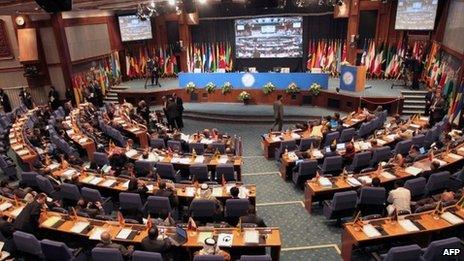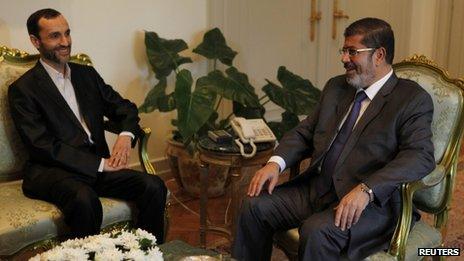Iran seeks to reap summit rewards
- Published

Iran is hoping the NAM meeting will project an image of solidarity
Under international sanctions for its controversial nuclear programme, Iran has faced down further Western attempts at economic and diplomatic isolation by hosting this year's meeting of the 120-nation Non-Aligned Movement (NAM) and is seeking to reap the benefits, reports the BBC's Mohsen Asgari in Tehran.
As Tehran prepares for some 7,000 visitors to descend on the city, a five-day public holiday has been called to clear the city of its stifling traffic and pollution.
Many families in the city have made the best use of the conference to take a long holiday at the end of summer while schools are still closed.
The northern part of the capital has been beautified, with lamp-posts and road markings freshly painted in shining blue and signs displaying doves of peace.
Placards, banners and posters declaring "The Non-Aligned Movement is a symbol of independence throughout the world" or "Lasting peace through joint global governance" are visible everywhere.
For Iran, the NAM conference is an important opportunity to portray itself as part of the international scene, despite intensive efforts by the United States and Israel to isolate it over its disputed nuclear programme.
"Holding the event in Tehran is a source of dignity. The world will see that the plots by the world's arrogant powers against the country are fruitless," an Iranian vice- president, Ebrahim Azizi, said.
"The conference proves it is not the global community that has problems with Iran, but the US and its puppets like Israel," said Ahmad Lotfi, a professor of international relations at the Islamic Azad University.
"Interestingly enough the Obama administration is admitting the point by trying to dissuade various leaders from attending the meeting," he added.
Guest list
Iranian officials have not yet given the full guest list for the summit, but leaders confirmed so far include Egyptian President Mohammed Mursi as well as Cuban leader Raul Castro and Indian Prime Minister Manmohan Singh.
Syrian Prime Minister Wael al-Halqi and Foreign Minister Walid Muallem will also attend, and Qatar's emir Sheikh Hamad bin Khalifa Al-Thani and Lebanese President Michel Suleiman are expected to show.
But it is the planned attendance of UN chief Ban Ki-moon that has drawn the fiercest criticism, with Israel describing the move as a "big mistake" and the United States calling it "strange".
US State Department spokesperson Victoria Nuland told reporters: "We frankly don't think that Iran is deserving of these high-level presences that are going there.''
Her comments came a few days after the new president of Egypt, a country that has long been alienated from Iran, said he would also attend the summit meeting - a decision that disturbed the Israelis.
Mohammed Mursi's decision is seen as a landmark trip after Iran cut its diplomatic relations with Egypt in 1979, following Cairo's peace deal with Israel.
"Iran and Egypt are moving towards restoring diplomatic relations which were severed more than three decades ago," Iranian Foreign Minister Ali Akbar Salehi said in an interview published on Tuesday.
"We will pursue this path and restoration of relations depends only on protocol measures."
The NAM is a grouping of nations that ostensibly see themselves as neither for nor against any of the world's major powers.
Trade talks
Some experts believe pressure from the US and Israel could not stop delegates from attending the conference.
Mohamadreza Salimi, a political journalist in Tehran, said: "Fifty-five per cent of the world's population are citizens of non-aligned nations. It's not something the United Nations secretary general can easily dismiss.
"How can [Mohammed] Mursi close his eyes on the biggest political gathering in the world after the UN while he needs to establish his foreign policies at the beginning of his term?"
The NAM summit also promotes the Islamic Republic's political face and could serve as a good political backup for Iran in its future talks with the five permanent UN Security Council members plus Germany.
The summit is also likely to help Iran boost its economy.
"The presence of the senior world officials in Tehran will prepare the way for bilateral and multilateral negotiations to help Iran bypass the Western sanctions, establish joint banks, set up transportation and transit networks," Iranian lawmaker Seyyed Hosseyn Naqavi told reporters.
The Islamic Republic Guard Corps has deployed tight security around the NAM meeting, deploying thousands of police on street corners and vehicle checkpoints.
They are blocking off the roads around the summit venue so that inside politicians can open new roads for Iran back into the international community.
- Published24 August 2012

- Published14 October 2024
